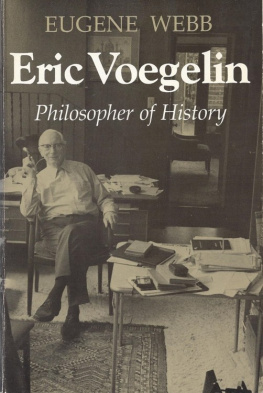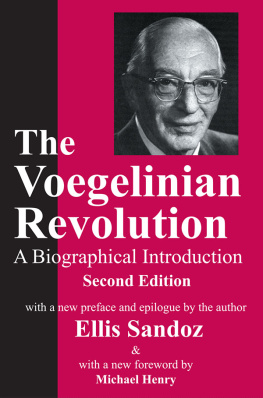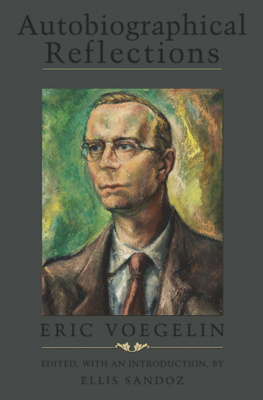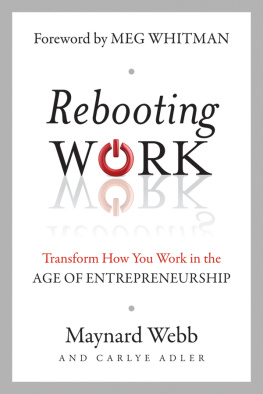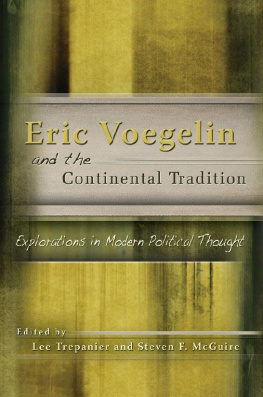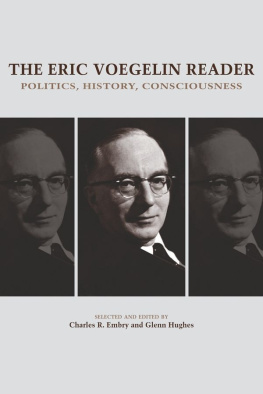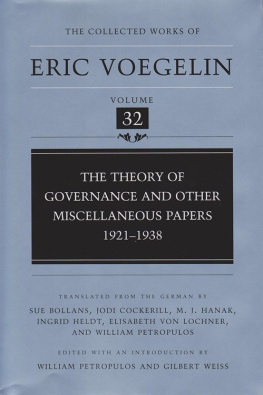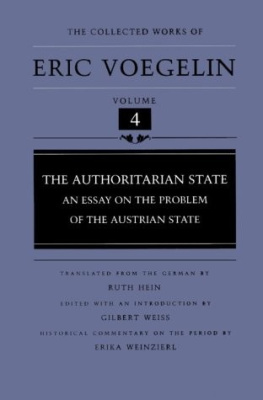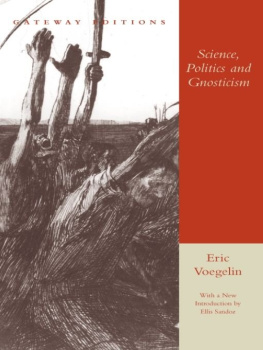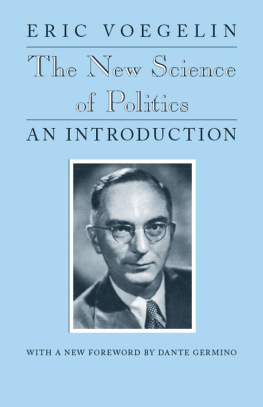ERIC VOEGELIN: PHILOSOPHER OF HISTORY
Eric Voegelin
Philosopher of History
by
EUGENE WEBB

Excerpts from the poems Dry Salvages and Little Gidding, by T. S. Eliot, are reprinted from his volume Collected Poems, 19091962 by permission of Harcourt Brace Jovanovich, Inc.; copyright 1936, by Harcourt Brace
Jovanovich, Inc.; copyright 1963, 1964, by T. S. Eliot.
Copyright 1981 by the University of Washington Press
Paperback edition 1987, 2014
All rights reserved. No portion of this publication may be reproduced or transmitted in any form or by any means, electronic or mechanical, including photocopy, recording, or any information storage or retrieval system, without permission in writing from the publisher.
Library of Congress Cataloging in Publication Data
Webb, Eugene, 1938
Eric Voegelin, philosopher of history.
Bibliography: p.
Includes index.
1. HistoryPhilosophy. 2. Voegelin, Eric,
1901 I. Title
D16.8.W37 901 8051078
ISBN 978-0-295-99438-3
The paper used in this publication is acid-free and meets the minimum requirements of American National Standard for Information SciencesPermanence of Paper for Printed Library Materials, ANSI Z39.481984.
For Eric and Lissie Voegelin
Preface
Although Eric Voegelin is one of the major philosophical thinkers of the twentieth century, his work is only beginning to be studied widely and intensively. It is my hope that the rapidly growing appreciation of his importance among historians, political philosophers, and scholars of comparative religion will bring him a larger and broader audience among the public at large. As I indicate in the Introduction, there are various reasons why many readers have found the approach to his thought difficult. My own purpose in writing this book has been to help the potential reader overcome such difficulties by providing an overview and some clarification of Voegelins basic concepts. I hope that the book will prove helpful to specialists and non-specialists alike, that it will make the thought of this important figure more readily available to those who have not studied it before, and that even those who have studied it may be helped to a deeper understanding of its theoretical foundations.
The present work is in three parts. The first is theoretical; it seeks to elucidate Voegelins philosophical principles and concepts and to explain how he developed them, both with reference to contemporary philosophical discourse and through the study of the history of thought. The second part briefly summarizes the main lines of Voegelins study of history as he has interpreted it in the light of those theoretical principles. The third part focuses on the two themes most central to Voegelins concern: the philosophy of religion and the philosophy of history. Because Voegelin uses many technical terms that may not always be readily clear from the context or easy to remember from one chapter to the next, I have appended a glossary in addition to a topical index.
I have many individuals to thank for helpful comments on the manuscript, a list too long to be included here. I would like to name at least a few, however, whose help I believe made the book better than it would otherwise have been: Michael Anderson, Dante Germino, William Havard, Robert B. Heilman, Rodney W. Kilcup, Thomas J. McPartland, and Donald W. Treadgold.
Most of all, I wish to thank Eric Voegelin himself for encouraging me in my work on this project, for reading and commenting on the manuscript at every stage of its development, and for his unfailing kindness, hospitality, and generosity in making both himself and his unpublished manuscripts available to me. I doubt that there has ever been a subject both so interesting to work on and so pleasant to work with.
This is not to say, of course, that either Professor Voegelin or any of the others I have named is in any way responsible for any inaccuracies or deficiencies of interpretation that may remain. If there are such, I hope there will be many future scholars of this subject eager to correct them.
Seattle, June 1980
Contents
ERIC VOEGELIN: PHILOSOPHER OF HISTORY
Introduction
THE thought of a major philosopher is always a challenge. Whether the philosopher is traditional or contemporary, his thought reaches beyond the horizon of his reader, and to study him is to explore experiences and perspectives that are unfamiliar, in which one often is uncomfortable, and which require a stretching that must be spiritual as well as intellectual. It is, of course, for this very reason that we call such a philosopher major. It is easy so to label a thinker from the past whom time has judged worthy. We accept, to some degree, the judgment of history. Approaching a contemporary, we become more suspicious and more guarded, less willing to put both our judgment and our habitual patterns of thinking at risk.
If this were the only obstacle to the reading of Eric Voegelin, however, the task of discussing him would be less formidable than it is. More than other contemporary philosophers, Voegelin seeks from his reader a radical shift in perspective from the one that has prevailed in modern thought for centuries. Moreover, there are a number of additional problems. Although Voegelin is widely known, he is far less widely read; his works have the reputation of being forbidding. This is not surprising, since he demands not only a radical shift in perspective but also a familiarity with the entire history of Western thoughtmythological, philosophical, and religious. And the fact that he has chosen to unfold the main lines of his own thought in a magnum opusOrder and Historythat now runs to four volumes and will include one more when it is finished tends to make him one of those authors consigned to a list of monuments to be gazed at respectfully from afar.
Many who have heard of Voegelin have also picked up mistaken
William Havard, whose acquaintance with Voegelin dates from his own freshman year as a student at Louisiana State University in 1943, the year that Voegelin began his sixteen years of teaching there, has said, Perhaps the real measure of the neglect of Voegelins efforts by American political scientists is the fact that he has not been ignored nearly as often as he has been dismissed with categorical labels, most of which indicate that the labeler has either not bothered to read him or, if he has read him, has not taken the trouble to understand him.
What makes Voegelins thought difficult to grasp for any person accustomed to the more common type of philosophical exposition is that he is not in any sense an ideological thinker. He does not present a system of ideas that could be labeled according to any of the traditional designationssuch as materialist, idealist, empiricist, realist, and so onand, what must be still more disconcerting to many, he does not even present a standard philosophical argument of the sort that leads the reader from premises to a conclusion through the force of formal logic. This, of course, might make it sound as if he is a dogmatic thinker; but that would be to return to the supposition that a philosophers aim must be to present and win assent for a doctrine. Voegelin, however, has a quite different conception of philosophy, and it will be the first, and perhaps the most important, task of the present study to make clear what that conception is. It will take time to do so, and that effort will have to wait for the main body of this study, but it will be helpful at this pointhaving said something about what type of philosopher Voegelin is notto indicate at least briefly what philosophy does mean to him.
Next page
